In Vitro Cardiovascular Hydrodynamic Testing System
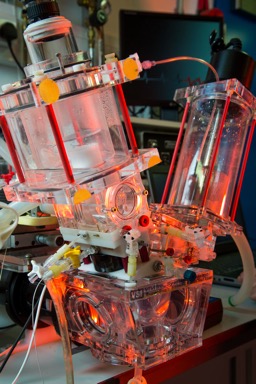 To assess the performance of prosthetic heart valves under simulated cardiac conditions, we have two ViVitro Pulse Duplicator (ViVitro Labs, Inc., Victoria, BC, Canada).
To assess the performance of prosthetic heart valves under simulated cardiac conditions, we have two ViVitro Pulse Duplicator (ViVitro Labs, Inc., Victoria, BC, Canada).
This is designed to meet ISO 5840, ISO 5840-3, ISO-17845, and FDA requirements, and is capable of testing a range of prosthetic heart valves including stented tissue, percutaneous, stentless, mechanical, and TAVI/TAVR.
The system simulates physiological or other complex pressure variations of the heart function, providing detailed quality data for heart valve and system performance.
Our customised apparatus includes compliant aortic chambers with native mock leaflets for percutaneous implants assessment, micro-tip pressure transducers, aortic and mitral electromagnetic flowmeters, physiological temperature control, ultrasound viscometer for continuous monitoring of the blood equivalence of the testing fluid, additional access ports for transcatheter implantation and high speed cameras for analysis of the valve dynamics. The system is controlled with a software developed in house, allowing additional flexibility, and is coupled with PIV facilities for the visualisation and measurement of the flow parameters.
Accelerated Durability Testing System
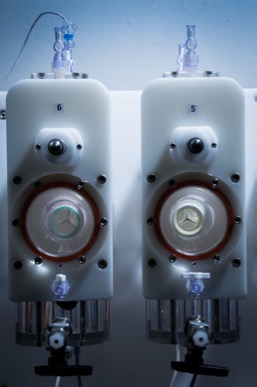 To predict the durability of heart valves, we use the VDT-3600i Heart Valve Accelerated Wear Tester (Biomedical Device Consultants and Laboratories, CO, USA). This provides temperature control and continual monitoring of the real-time differential pressures in all test stations to verify the adherence to ISO 5840 testing requirements. Also, it enables individual station alarm capabilities to halt the system in case any sample exceeds its loading requirements.
To predict the durability of heart valves, we use the VDT-3600i Heart Valve Accelerated Wear Tester (Biomedical Device Consultants and Laboratories, CO, USA). This provides temperature control and continual monitoring of the real-time differential pressures in all test stations to verify the adherence to ISO 5840 testing requirements. Also, it enables individual station alarm capabilities to halt the system in case any sample exceeds its loading requirements.
Our system, which includes up to 12 testing sections, is specifically customised to host compliant mock arteries and assess stented tissue, stentless, mechanical, percutaneous and transcatheter valves.
PIV System
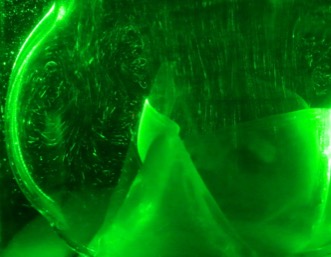 Particle Image Velocimetry (PIV) can provide significant support to the understanding of the hemodynamics in normal and altered conditions.
Particle Image Velocimetry (PIV) can provide significant support to the understanding of the hemodynamics in normal and altered conditions.
We use a TSI 2-D PIV system, including two 70 mJ pulsed laser, lightsheet optics, a synchroniser, and a 4MP-HS camera.
The system is integrated with our cardiovascular hydrodynamic testing machine
Material Testing
We perform structural characterisation of biomaterials by means of uniaxial and biaxial mechanical testing.
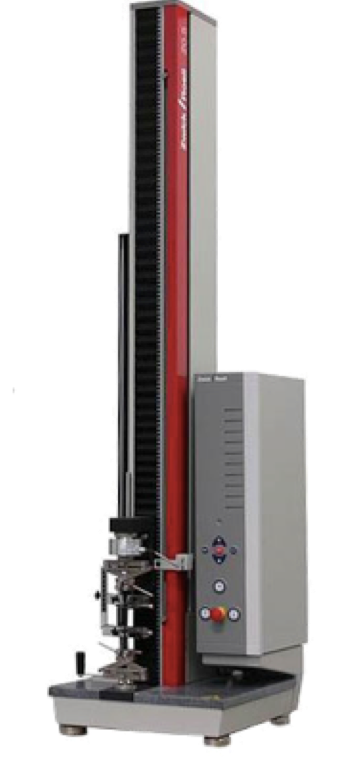 For uniaxial testing, we use a zwickiLine testing machine (Zwick/Roell, Germany), which is specially designed for mechanical testing applications involving low test-loads. The apparatus allows tensile, compression and flexure tests, under quasi-static loading with continuous, static, pulsating or alternating load sequences via an electro-mechanical drive. Our machine is equipped with a media container with temperature control unit, and cryostat. This allows to perform tests maintaining physiological body conditions, and vary the media temperature from -20 °C to 120 °C, for the determination of the material parameters of devices made of nitinol.
For uniaxial testing, we use a zwickiLine testing machine (Zwick/Roell, Germany), which is specially designed for mechanical testing applications involving low test-loads. The apparatus allows tensile, compression and flexure tests, under quasi-static loading with continuous, static, pulsating or alternating load sequences via an electro-mechanical drive. Our machine is equipped with a media container with temperature control unit, and cryostat. This allows to perform tests maintaining physiological body conditions, and vary the media temperature from -20 °C to 120 °C, for the determination of the material parameters of devices made of nitinol.
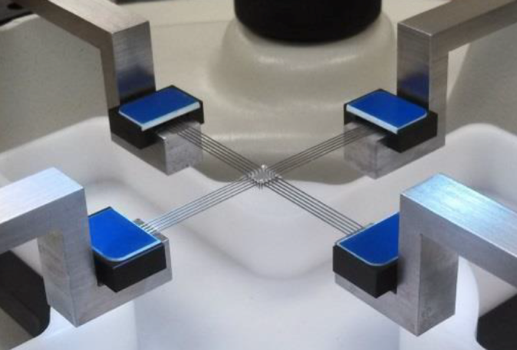 We perform biaxial tests using a BioTester (CellScale Biomaterials Testing, Canada). The system includes 2 high-performence actuators, and a temperature controlled media bath, and is integrated with a time synchronised high resolution CCD camera for the acquisition and processing of the test results. The solution allows to perform multi-modal cyclic, simple, and relaxation testing over a wide range of strain rates.
We perform biaxial tests using a BioTester (CellScale Biomaterials Testing, Canada). The system includes 2 high-performence actuators, and a temperature controlled media bath, and is integrated with a time synchronised high resolution CCD camera for the acquisition and processing of the test results. The solution allows to perform multi-modal cyclic, simple, and relaxation testing over a wide range of strain rates.
For high test-loads, we also have access to the testing facilities at UCL Mechanical Engineering.
Software Capabilities
We have available a number of softwares for 3D CAD, implicit and explicit numerical simulations, FSI analyses, system design and other technical applications.
3D CAD Software
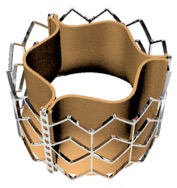 For 3D modelling, we use CATIA, the world leading solution for product design, and Rhinoceros, a stand-alone, commercial NURBS-based software suitable for engineering design, CAD/CAM, and rapid prototyping.
For 3D modelling, we use CATIA, the world leading solution for product design, and Rhinoceros, a stand-alone, commercial NURBS-based software suitable for engineering design, CAD/CAM, and rapid prototyping.
FEA, CFD and FSI
For Finite Element Analyses we have available a selection of implicit software such as MSC Patran, MSC Nastran, ANSYS, ABAQUS and Marc/Mentat; and explicit software, also suitable for FSI, such as LS-DYNA and MSC Dytran.
For CFD we use Star CD.
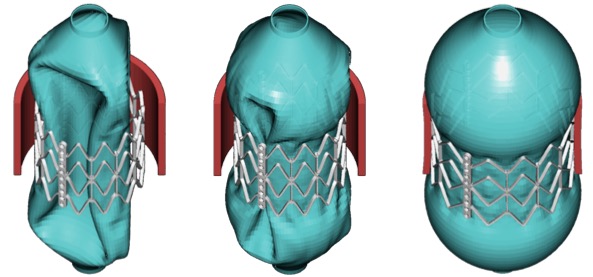
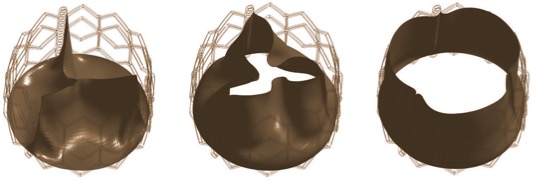
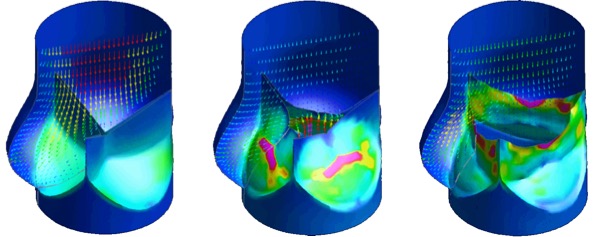
Photoelastic Stress Analysis
 We use polariscopes to perform experimental photoelastic stress analysis in two- and three-dimensional transparent components and models. We apply the technique to both rigid and flexible structures, to study and quantify the stress distribution into bones, stents, mock arteries and polymeric heart valves.
We use polariscopes to perform experimental photoelastic stress analysis in two- and three-dimensional transparent components and models. We apply the technique to both rigid and flexible structures, to study and quantify the stress distribution into bones, stents, mock arteries and polymeric heart valves.
The determination of stress parameters is performed automatically by means of RGB and phase stepping methods.
Prototyping
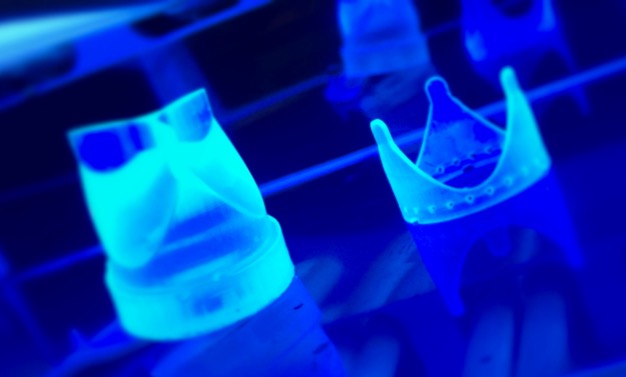 Our equipment includes various machines for rapid prototyping by additive manufacturing or 3D printing technologies (based on fused deposition modelling and stereolithography), laser cutting facilities and a range of ovens suitable for the thermosetting of Ni-Ti alloys and curing of polymeric materials. For accurate prototyping of medical flexible components we use a computer-controlled sewing and embroidery machines, to precisely extract suture lines from CAD files. Moreover, we have access to the advanced manufacturing capability at UCL Mechanical Engineering and at the ‘Institute of Making˙
Our equipment includes various machines for rapid prototyping by additive manufacturing or 3D printing technologies (based on fused deposition modelling and stereolithography), laser cutting facilities and a range of ovens suitable for the thermosetting of Ni-Ti alloys and curing of polymeric materials. For accurate prototyping of medical flexible components we use a computer-controlled sewing and embroidery machines, to precisely extract suture lines from CAD files. Moreover, we have access to the advanced manufacturing capability at UCL Mechanical Engineering and at the ‘Institute of Making˙
We also have a long experience in the use of casting and dip-molding of polymeric materials, for the creation of functional components and mock anatomical chambers.

 Close
Close


 To assess the performance of prosthetic heart valves under simulated cardiac conditions, we have two ViVitro Pulse Duplicator (ViVitro Labs, Inc., Victoria, BC, Canada).
To assess the performance of prosthetic heart valves under simulated cardiac conditions, we have two ViVitro Pulse Duplicator (ViVitro Labs, Inc., Victoria, BC, Canada).  To predict the durability of heart valves, we use the VDT-3600i Heart Valve Accelerated Wear Tester (Biomedical Device Consultants and Laboratories, CO, USA). This provides temperature control and continual monitoring of the real-time differential pressures in all test stations to verify the adherence to ISO 5840 testing requirements. Also, it enables individual station alarm capabilities to halt the system in case any sample exceeds its loading requirements.
To predict the durability of heart valves, we use the VDT-3600i Heart Valve Accelerated Wear Tester (Biomedical Device Consultants and Laboratories, CO, USA). This provides temperature control and continual monitoring of the real-time differential pressures in all test stations to verify the adherence to ISO 5840 testing requirements. Also, it enables individual station alarm capabilities to halt the system in case any sample exceeds its loading requirements.  Particle Image Velocimetry (PIV) can provide significant support to the understanding of the hemodynamics in normal and altered conditions.
Particle Image Velocimetry (PIV) can provide significant support to the understanding of the hemodynamics in normal and altered conditions. For uniaxial testing, we use a zwickiLine testing machine (Zwick/Roell, Germany), which is specially designed for mechanical testing applications involving low test-loads.
For uniaxial testing, we use a zwickiLine testing machine (Zwick/Roell, Germany), which is specially designed for mechanical testing applications involving low test-loads. We perform biaxial tests using a BioTester (CellScale Biomaterials Testing, Canada). The system includes 2 high-performence actuators, and a temperature controlled media bath, and is integrated with a time synchronised high resolution CCD camera for the acquisition and processing of the test results.
We perform biaxial tests using a BioTester (CellScale Biomaterials Testing, Canada). The system includes 2 high-performence actuators, and a temperature controlled media bath, and is integrated with a time synchronised high resolution CCD camera for the acquisition and processing of the test results. For 3D modelling, we use CATIA, the world leading solution for product design, and Rhinoceros, a stand-alone, commercial NURBS-based software suitable for engineering design, CAD/CAM, and rapid prototyping.
For 3D modelling, we use CATIA, the world leading solution for product design, and Rhinoceros, a stand-alone, commercial NURBS-based software suitable for engineering design, CAD/CAM, and rapid prototyping.


 W
W Our equipment includes various machines for rapid prototyping by additive manufacturing or 3D printing technologies (based on fused deposition modelling and stereolithography), laser cutting facilities and a range of ovens suitable for the thermosetting of Ni-Ti alloys and curing of polymeric materials. For accurate prototyping of medical flexible components we use a computer-controlled sewing and embroidery machines, to precisely extract suture lines from CAD files. Moreover, we have access to the advanced manufacturing capability at UCL Mechanical Engineering and at the
Our equipment includes various machines for rapid prototyping by additive manufacturing or 3D printing technologies (based on fused deposition modelling and stereolithography), laser cutting facilities and a range of ovens suitable for the thermosetting of Ni-Ti alloys and curing of polymeric materials. For accurate prototyping of medical flexible components we use a computer-controlled sewing and embroidery machines, to precisely extract suture lines from CAD files. Moreover, we have access to the advanced manufacturing capability at UCL Mechanical Engineering and at the